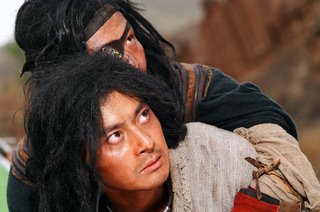









Chen Kaige Fulfills His Promise
--- China master Chen Kaige discusses his latest fantasy epic “The Promise”
By Andrew C.C. Huang
Contributing Writer
(This article originally appeared in Taiwan News on December 25, Friday 2005)
The most anticipated Chinese-language movie this year, China master Chen Kaige’s first foray in the kungfu genre “The Promise” is a brilliant latest chapter in the kungfu-drama subgenre in the vein of “Crouching Tiger, Hidden Tiger,” “Hero” and “House of Flying Daggers.”
As Ang Lee says, “every Chinese director wants to direct a kungfu movie.” Three major directors have jumped into the water while Wong Kar Wai, Hou Hsiao-hsien and John Woo have announced their plans to venture into the genre too. There is no dispute in the inexplicable universal appeal in the kungfu movie genre to the global audience.
Kungfu movies is the equivalent of the super hero movies inspired by comic books in the western world. “Crouching Tiger, Hidden Dragon” is the Chinese counterpart to George Lucas’ “Star Wars” series in which the common people’s desires for a better world is projected into the hero’s journey in the movie. Like the comic book genre in the U.S., the kungfu novel genre was once a disdained and even banned genre that has finally become mainstream culture sweeping across the globe because it reflects and speaks to the people’s desires world-wide.
Chen Kaige’s “The Promise” recounts the story of the Princess Qinsheng who is so ravishingly beautiful that every man falls in love with her on sight. Qinsheng stays at the King’s extravagant court but lives a loveless life because she made a pledge with the Goddess of Fate to give up love in exchange for material fulfillment. Her sad fate turns when the slave Kunlen kills the King and rescues her away. During the escape, she is captured by the Duke of North as an object of love. The General Quanming sends his slave to rescue Qinsheng and claims her as lover. Torn between the loves of three men, Qinsheng gradually finds out what her pledge with the Goddess with lead her to in a surprise ending.
For Chen Kaige, there is no doubt that he is jumping on the bandwagon of the global highbrow kungfu. However, it’s a test of the director’s range to see if he could move from art-house piece into mega production while maintaining his heart. Chen has proved he could.
During Chen Kaige and his producer/actress wife’s press junket in Taipei last week, Chen said : “The comparison to ‘Lord of the Rings’ is unfitting. “Lord of the Rings’ is adapted from literature and is a trilogy while “The Promise” is based on our original play.”
Despite Chen’s denial, the comparison is inevitable. Both “The Promise” and “Lord of the Rings” series belong to fantasy genre. Even more eerily, both movies start with the similar caption epilogue that “in the beginning of the world, human beings and gods co-exist.” Both movies are mythology stories where gods, demons, demi-gods and human beings engage in existential battles before the world take its shape.
The theme of love run through in both movies as well. In “Lord of the Rings,” the fairy Arwen gave up her immortality in order to be with her beloved general Aragorn. In “The Promise,” Qinsheng breaks her promise with the Goddess and opts to forsake fortune and Princess status for the love of the slave Kunlen .
For the special effects needed for the movies, it took years for Chen to warm up to the idea of it. “I used to be really resistant about using special effects in movies. I think the movie’s story is the most important thing and I shy away from special effects,” said Chen. “However, in order to create the atmosphere of a fantasy world required by the story of ‘The Promise,’ I finally gave up my prejustice against special effects and tried my best to use it to serve the story.”
“The Promise” marks many first for Chen --- his first kungfu movie, his first fantasy genre movie and his first movie with a happy ending. “My past movies about China’s feudal past are heavy and serious. They are harder for the audience to swallow,” Chen explained. “But in my private life, I am not someone who is serious all the time. I want to enjoy my life too. Therefore, for “The Promise,” I decided to inject in some elements of my childhood fantasy and dreams to make it a more optimistic and happy movie.”
For a fantasy movie, Chen considers the setting and costume another characters in the movie. To achieve the ideal results, he invited Oscar winning designer Tim Yip to oversee the art direction and costume design.
“It’s essential for all the major characters to have very unique and distinctive images and costumes,” said Chen. “Tim did such a fantastic job in designing these characters.”
“I considered the several key settings as another character of this movie because they reflect the mood of the characters,” said Chen. “For the design of the Imperial city, the Parliament court and the Cherry Tree Villa, Tim did an excellent job too.”
Actress/producer Chen Hong, who is the wife of Chen Kaige, scolded her husband in jest at the press conference. “He did not even try to give me face (reputation)!” Chen laughed. “He corrected me as soon as my performances are not up to his standards as with all the other actors. I didn’t have any privilege as his wife and the producer of the movie. He told me ‘the Goddess has to speak slower and gesticulate faster’.”
Because Chen’s character is the Goddess of Fate or “Mansheng” in the movie, she spends her entire shooting time performing in front of the blue screen with wire work in order to create the effects of a goddess flying in the sky. “He is perfectionistic and relentless,” Chen Hong complained laughing. “I spent so much time hanging on the wire that my body was all bruised. But he told the crew not to let me down ‘just because I am the producer’. Then, of course, when we went home after a day’s shooting and he had to be nice to me to compensate me.”
As a kungfu fantasy movie, “The Promise” is in nature much closer to Hong Kong master Tsui Hark’s “Legend of the Zu” rather than Ang Lee’s “Crouching Tiger” or Zhang Yimou’s “Hero” which are set in a specific historic period in China. As with Tsui’s “Zu” series, the world of “The Promise” is a universe in its early birth where gods, monsters, ghouls and human beings co-exist, fight and fall in love with one another. As a result, “The Promise” is a big spectacular visual Pon Pon because all the characters in lavishing costumes literally spend most of their time flying through the sky in this movie. Gravity doesn’t really apply in a movie where all the major characters possess supernatural power.
Why does the kungfu genre cross all cultural barriers and speak to audiences world-wide? The spectacular action scene and the lavishing costumes do not hurt, but, ultimately, it’s the kungfu hero’s journey that speaks to all of us. Seeing the hero’s trials and tribulations on the screen, we are reminded again that fighting against the system and bettering one’s life are possible. We realize that we do not have to be the prisoners of fate’s misdoing or a corrupted system we didn’t create.
The serialized kungfu novels started flourishing after the founding of the Republic of China and peaked in the 70’s with Qing Yuan and Gu Long claiming the titles as the two modern master of kungfu novel.
Coming to birth after the Republic of China is not coincidence at all. Kungfu novels reflect the Chinese common people’s desire to go for freedom and independence and topple the inhumane tradition of China’s dynastic tradition. A common Chinese saying states that “kungfu novel is the fairytale story for adults.”
In every kungfu novel, the protagonist is always a poor underdog child with his parents wrongly killed a corrupted swordsman triad or the government. This child practices exceedingly hard to become a supreme kungfu master in order to exact revenge against the decaying swordsman triad or the corrupted government figures. “Go to hell, Confucianism,” all the kungfu novels imply. “We don’t want a rigid social hierarchy system where the young has to be beaten by the elders even if the young is right. We want a new China where everyone is equal and has at least the chance to compete fairly in life.”
Fighting against the system has its price. But the kungfu hero tells us that complying to lives we don’t want has a even better price. Through kungfu movies, we look at the hero’s struggle and contemplate about our own life and ideals. And then, we realize, what is life without ideals and dreams? As long as ideals and dreams exist, kungfu novels and movies will continue to flourish.

Comments